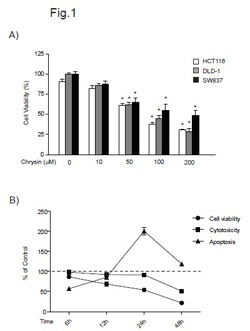|
Back to 2014 Annual Meeting Abstracts
Aryl Hydrocarbon Receptor Is Required for Induction of Apoptosis by the Flavonoid Chrysin in Colon Tumor Cells
Sean Ronnekleiv-Kelly*, Manabu Nukaya, Patrick Carney, Gregory D. Kennedy
Surgery, Univ of Wisconsin, Madison, WI
Introduction: The aryl hydrocarbon receptor (AHR) is a ligand-binding transcriptional receptor that has been implicated in a number of GI malignancies including colon and rectal cancer. Chrysin, a member of the family of natural flavonoids isolated from propolis, is an AHR ligand and has been found to induce cell death or arrest cell proliferation in various tumor cell lines in vitro. We have hypothesized that chrysin will inhibit growth of colon cancer cells and that this inhibition is dependent upon the AHR.
Methods: The cell viability, cytotoxicity and apoptosis in colon tumor cells were measured by XTT assay (Life technologies, Carlsbad, CA) and ApoTox-Glo™ Triplex Assay system (Promega, Madison, WI). The apoptotic cells were detected by TUNEL assay (Promega). The si-scramble (control) and si-AHR expression HCT116 cells were generated by stable transfection of small interfering-RNA (si-RNA) expression vectors. The transcriptional activity of AHR was measured by dual-luciferase reporter gene assay system (Promega). Statistical analysis was performed with GraphPad Prism 5 for Windows.
Results: We found a dose dependent increase in AHR transcriptional activity (increase of Cyp1a1 mRNA by 8 fold over control, P<0.05). This effect was confirmed using an AHR responsive luciferase reporter assay. Cell viability was reduced in all three colon tumor cell lines exposed to chrysin (Figure 1A) and this seemed to be due to an increase apoptosis (200% of apoptosis compared to control, P<0.05, Figure 1B). Stably transfected cells expressing si-AHR were resistant to chrysin-induced cell apoptosis compared to si-Scramble expressing cells (80% viability v. 60% viability, P<0.05).
Conclusion: Using three different colon tumor cell lines and creating AHR si-RNA cells, we have found (1) that the chrysin-induced cell death in colon tumor cells is due to apoptosis and (2) the apoptosis mediated by chrysin in these cell lines requires AHR. Current work is focusing on elucidating the mechanism by which AHR participates in the induction of apoptosis. If chrysin will prove to be a novel chemotherapeutic in the future remains to be determined.

Back to 2014 Annual Meeting Abstracts
|


